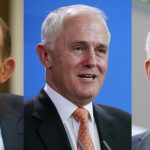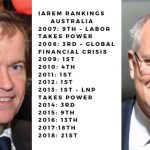Murdoch’s Politicking Is Business as Usual. But Is His Influence Waning?

There’s been talk of News Corp ramping up its anti-Labor coverage over the last six months, as if it’s some sort of deviation from the norm. However, what’s closer to the truth is, the Murdoch press has been sticking to its regular form, as it’s intensified its support of its beleaguered political ally.
The real anomaly that took place recently, was when the likely next prime minister Bill Shorten told Rupert Murdoch – who’s said to own 70 percent of Australia’s newspaper circulation – that he wouldn’t be dropping in for the traditional US meet and greet with the media mogul.
For this transgression, it seems Shorten had to be subjected to a Daily Telegraph slandering aimed at the Q&A remembrance of his late mother. Although, it’s more likely the paper laid into his television appearance, as the rest of the media were hailing it as the moment Shorten “won the election”.
The Labor leader described the front page attack as a “new low”. And while it might have seemed that way to him, there’s certainly a number of other News Corp victims along the way that have felt the same, as what’s been dished out lately is just business as usual going back near on half a century.
Viagra wouldn’t work
After the Coalition clocked up its 55th consecutive Newspoll loss last Sunday, it’s fair to say it’s on shaky grounds. So, the fact that the conservative-aligned Murdoch press has been targeting the relatively progressive Labor party with such loud attacks should come as no surprise.
Social affairs writer at the Australian Rick Morton told UTS journalism students last week that reporters at that News Corp paper have been “more uncomfortable” about the brazen support for the Coalition over the last six months, than they’ve ever been during the past seven years.
However, over those seven years, the Coalition won the 2013 election, governed in office and successfully took out the following election. And it’s only been the last six month period that the ailing conservatives have needed a higher dose of media prop up for obvious reasons.
The fallout from the Murdoch-backed Liberal leadership spill lead to Coalition support plummeting, the unlosable Wentworth byelection went to Dr Kerryn Phelps, and for the next half year the nation has been scratching its head trying to work out what Scott Morrison has been up to at the helm.
A new playing field
Morton also explained that he wasn’t quite sure whether the change in the newsroom at the Australian was indicative of “death rattles or loss of relevance”. But, whichever it is, Shorten’s snubbing of Rupert’s invitation certainly shows he’s aware that the power differentials have shifted.
Where, in earlier days, it would have been political suicide not to attend a meeting with the News Corp executive chairman, Shorten’s January public rebuff signalled not only did he not need Murdoch’s support, but further that his endorsement is no longer necessary to hold the top office.
Former Labor PM Kevin Rudd praised Shorten’s decision in February. He explained that when he paid a visit to Murdoch in 2007, it gained him support for that year’s election, but not in the long-term. In fact, during the 2013 election, the media mogul stuck in the knife with glee.
“The only time Murdoch tries to get into bed with federal Labor leaders is when his editors conclude that, despite News Corp’s efforts, the conservatives will not win anyway,” Rudd further explained, meaning that Shorten was well-aware he was knocking back Murdoch’s election nod of approval.
“Mother of Invention”
On 7 May, during his appearance on the ABC’s Q&A, Mr Shorten related the story of his mother, who had scarified her early ambition to be a lawyer, in order to take up a teaching scholarship, as due to family financial commitments, she couldn’t afford to follow her dream.
And as the Daily Telegraph’s NSW political editor Anna Caldwell pointed out on the following day, Shorten’s four minute “heartfelt account” of his mother’s life was being praised by other news services as perhaps the most “powerful” moment of the entire election campaign.
So, being a good New Corps employee, Caldwell shot the Labor leader’s recollection down. While it was true Anne Shorten hadn’t followed her law ambitions when she young, Caldwell explained, she actually did in her later years: Shorten’s mother went onto study law and practice at the Bar.
Shorten appeared before reporters on 8 May close to tears, decrying the “rubbish” attack.
And as the criticism grew stronger, Caldwell appeared on Sky News defending the piece, explaining that it was not an assault on the late Ms Shorten, but a story articulating her “incredible career”.
And while the outcry over the story was unanimous in its condemnation of News Corps for having gone too far this time, in actual fact, the Murdoch press pretty much stuck to the same rules it’s been operating under for decades now.
A colonial throwback
Renowned journalist John Pilger recalled in 2010 that Murdoch had backed Whitlam in the 1972 election. But, when the new PM became a “radical reformer”, the outraged media boss hit back with such biased reporting that his journalists from the Australian burned the paper in the streets.
While in 2011, Pilger outlined that Murdoch’s most persistent smear campaign has been against First Nations communities. In 1984, Labor pledged to legislate for Aboriginal land rights. Although, it was the Murdoch press that reported on a lack of support, despite having evidence to the contrary.
Indeed, in 1957, following public outcry over findings that Indigenous people in the outback faced shocking conditions, the young Adelaide News editor, Rupert Murdoch, went out to the region and reported back to those concerned that the First Peoples had never “enjoyed better conditions”.
A changing of the gatekeeper
However, in today’s technological landscape, those living in urban areas wouldn’t have to rely on a single media source to travel to a remote location, make its own assessment, and then make its way back to the city to print up its version of events to disseminate amongst the wider population.
Right now, a multitude of online media outlets can report on a remote event, whilst the local people themselves can comment and report on social media. What’s more it’s instantaneous. And it’s in this environment that Bill Shorten finds it unnecessary to bow before the old guard prior to taking office.







